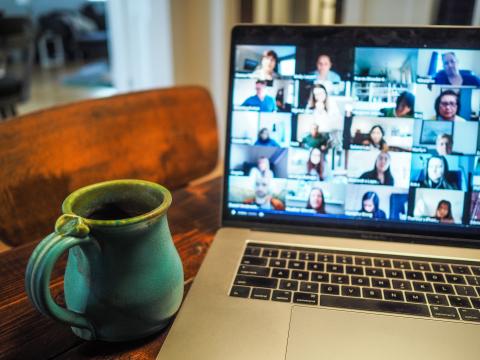apistone
January 7, 2022
To write about the Capitol Insurrection, as the one-year anniversary approached, I went back through my chat logs from January 6, 2021, in the interest of refreshing and confirming my memory. What I found, in lieu of any particularly meaningful conclusions, was a window into that day and how some friends and I were dealing with catastrophic events as they unfolded.
That day, I had a university meeting wedged between SCS panels, and I think I actually found the precise moment when I realized what was going on. That moment is a fairly profanity-laden series of messages with a very-online friend of mine, to whom I sent “So what the fuck is happening in DC?? I've been in meetings and the capitol building is being stormed??” followed by “i allegedly have another meeting right now and i am physically nauseous after having like a 5 minute break and seeing the news.”
In all my other group chats, things progressed about the same. Conversation about the SCS conference and pre-semester preparation, interrupted by a confused panic about what was happening on the news. A bunch of millennial classicists trying frantically to figure out where they can watch live news and wondering why all the afternoon panels weren’t canceled (though some were), processing anger and fear in countless group-chats and DMs.
It’s been a surreal experience to go back through these real-time reactions and relive the visceral feelings we were all processing together, particularly given that a collective, traumatic experience was happening at a time when our professional community was in a shared, albeit virtual, space. I intend no offense to any of my colleagues, but the classics community writ large is not actually one of the first places I usually go to process trauma. In some ways, the timing of things forced a collision of my personal and professional support networks in a way that I did not particularly note at the time — a time when I had other, more pressing concerns taking most of my attention away from anthropological self-reflection — but in a way that is quite striking as I read through these records of the day.
It’s strange to process something like that with people who range from your closest friends to people with whom you share only an interest in ancient Mediterranean culture. With my closest classicist friends, there’s a real vein of dark humor cutting through the shock, including the line “what the fuck... i just went for a short nap and woke up to civil war?,” which elicited a laughing-while-crying emoji reaction, followed by a clarification that “I’m not laughing at the situation but I’m laughing at that.”
There’s a sort of daring intimacy in the sharing of jokes in a time of crisis. Bleak jokes in the face of deadly serious events are a very high-risk/high-reward sort of communication, because they are necessarily predicated on trust and closeness. My close friends know who I am and would not misinterpret jokes as a dismissal of the seriousness of the events at the capitol. Those close personal communities were thrown into sharp contrast when compared with the purely professional communities within the conference as a whole. In personal settings, I can see us sharing the experience of bonding over the communal processing of a tragedy, something noticeably absent in the conversations taking place in the Zoom chat for the panels that were still happening. Rereading these records with a year of distance and a philological eye, I can see the linguistic evidence of the varying degrees of closeness I feel with different communities within the field.
The last thing that strikes me in these transcripts is how much or little people were interested in connecting the ongoing crisis with the ongoing conference. The afternoon of the 6th, a classics friend sent me this: “i'm not into the immediate ‘lets compare this to events in the ancient world’ responses, but i suppose we all respond differently to extreme stimuli.” The ancient world, and its ongoing legacy in the modern world, is something that most of us spend a great deal of time thinking about.
For many of us, classical literature is where we turn for stories that help us process the world around us. Greek mythology is regularly a source of metaphor and symbol for me — consciously or not, these are the stories that I have internalized on a deep level, and they have become a lens through which I interpret my world. In the months since January 6th, there have been a lot of wonderful pieces of cultural and historical criticism that juxtapose ancient exempla with the insurrection. The end of the Roman Republic is indeed “good to think with,” a phrase that all good academics are contractually obligated to use from time to time. Our ancient sources are replete with instances of stasis and civil war, both historical and mythological. My students and I have benefitted greatly from the public-facing writing that so many have done on this front.
That being said, in that moment, the last thing I cared about was what ancient Greek authors had to say about anything. What would Sophocles tell us about this? Honestly, who cares? I was sitting alone in a room, in the middle of a global pandemic, trying to listen to a paper about Homer, and none of what we were doing at that moment felt like it mattered even a little bit. It’s hard to think that the research I do is of pressing importance in the face of all the horrific crises that have been unfolding in the past several years. Don’t get me wrong, I really like the work I do, but it’s not curing COVID, and it’s not stabilizing an increasingly unstable society. And sometimes it’s hard to feel like this is the best use of my time when so much is wrong.
My initial response to the idea of writing about January 6th was “I have some thoughts, though they are predominantly about the experience of trying to care about the SCS while watching an insurrection unfold and feeling like my stupid paper was pretty meaningless in the grand scheme of things,” and I felt that I could offer “a bleak, nihilistic reflection with maybe some glimmers of less-bleakness around the edges.”
In the interest of those glimmers, let me note that over the past year I’ve come to see that one of the best and most meaningful things that I can do is focus more intently on the people in my close, personal circles. Whether that means my friends, colleagues, or students, there’s been something uniquely meaningful about pouring concentrated care into the people in my immediate sphere of influence.
It’s been alarmingly easy to slip into rage and despair over the past year, but I do find some hope and solace in the idea that I can do concrete good in my friends’ and students’ worlds. No good has come from focusing my anxiety and attention on things that I cannot meaningfully impact, but detailed care and attention to my personal networks and communities is a place where I can find some less-bleak light.
Header image: Image courtesy of Chris Montgomery via Unsplash.
Authors


